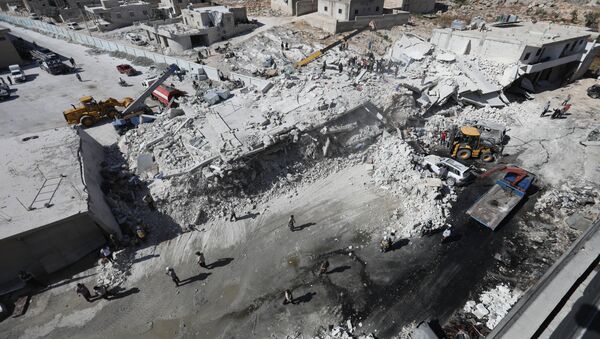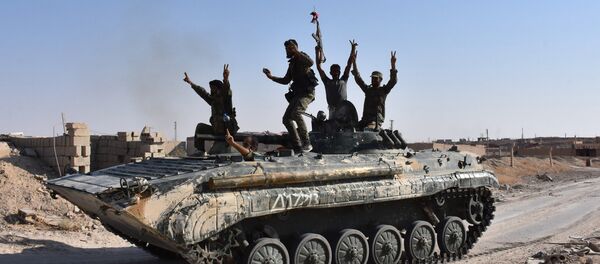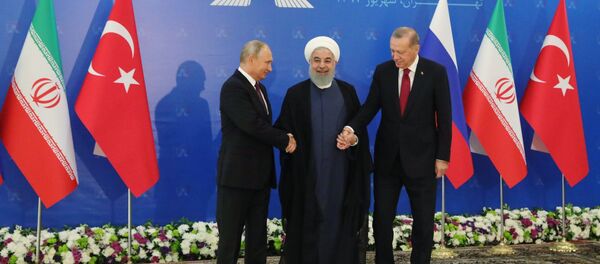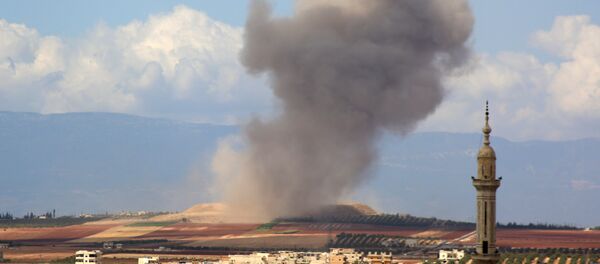Earlier on Friday, the leaders of Syrian ceasefire guarantor states — Iranian President Hassan Rouhani, Russian President Vladimir Putin and Turkish President Recep Tayyip Erdogan — held a trilateral summit in the Iranian capital of Tehran.
As a result, in the final statement the proposed truce was not mentioned but a softer formulation saying that the ceasefire guarantor states "took up the situation in Idlib de-escalation area and decided to address it in line with the above-mentioned principles and the spirit of cooperation that characterized the Astana format" was used.
READ MORE: Terrorists in Syria's Idlib Active in Aggressive Way, Stage Attacks — Envoy
The province of Idlib is mostly controlled by armed opposition and terrorists rather than Syrian government forces. Russian officials have recently warned that there was a possibility of a staged chemical weapons attack in the area, aimed at blaming Damascus and provoking Western countries into retaliating against the Syrian government.
Ankara's Special Role in Syria
"Ceasefire in Idlib is not impossible. Three major actors are united, but the question is whether someone will put fuel on the fire now. This does largely depend on Turkey," Brisset indicated.
He explained that unlike Russia and Iran, whose interests in Syria are clear enough, for Turkey its presence in Syria served as a source of contradictions and problems.
"Whatever happens will oblige Turkey to abandon certain positions it has taken," Brisset believed.
READ MORE: Putin: Most Important Now is To Kick Terrorists Out of Syria's Idlib
Tarek Ahmad, a representative of the Syrian Social Nationalist Party (SSNP), stated in an interview with Sputnik that Turkey's assistance was required to find a permanent solution in Syria and destroy the last strongholds of terrorist groups in Idlib.
"The Turkish help is very needed in this issue, and I hope Erdogan will act rationally and in everyone's interests," Ahmad said.
New Geopolitical Reality
"The Turkish-US relations are at their worst, that is why Turkey needs an agreement with Russia and Iran. It seems that Erdogan is working on a new geopolitical curve, when it comes to its role in Idlib, to its relations with the West and NATO, and the solution for Idlib will create a new geopolitical reality in the Turkish-Western relations… The United States and its regional partners would be politically hurt by it," Ahmad said.
Brisset, in turn, was more optimistic about the West's possible reaction to the initiative, saying that the suggested truce in Idlib might prove good for the Western countries.
READ MORE: Turkey Has Reportedly Proposed Evacuating Militants From Syria's Idlib
"Now whether the Western partners will accept that it works or whether they will hamper it — this is a question. There are directly visible provocations and reactions, and then there are things which can be done through hidden operations," Brisset pointed out.
Brisset, however, did not rule out the possibility of attempts by the United States or Israel to provoke some incidents on the ground in Syria to hamper the truce establishment in Idlib.
The views and opinions expressed by the speakers do not necessarily reflect those of Sputnik.




